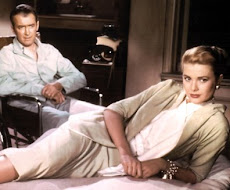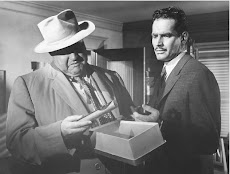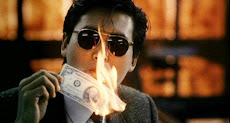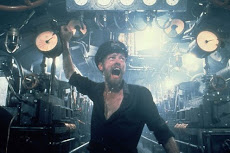It may be simply because this is one of the few movies I grew up with (as in actually had it on tape to watch at any time, and thus watched many a time), but this seems the "gimme" post of this series. Nevertheless, there's no better candidate.
Envy in Amadeus (1984)
Envy is "painful or resentful awareness of an advantage enjoyed by another joined with a desire to possess the same advantage." Such is embodied in the fictionalized account of Antonio Salieri (played by F. Murray Abraham), an Italian composer who rose to the ranks of court composer for Emperor Joseph II (the "Musical King") and reached the height of popularity, only to live long into old age and hear his music fade away as the work of one of his contemporaries became timeless.
"Wolfgang Amadeus Mozart."
Confessing to a priest in a sanatorium after a suicide attempt, Salieri is again a character who does not repent. Telling his tale, we learn that after achieving so much in his life, Salieri quickly begins to dismiss his blessings upon meeting Mozart. Mozart's music is just as powerful then as it is now, and even though Salieri remains highest in the emperor's opinion, Salieri knows better. It does not help that Mozart knows his own greatness, and displays pride that makes him seem all the more undeserving of his gifts.
Mozart is also a drunk, licentious and crass. Salieri is a fairly devout Catholic until he meets Mozart, and it tests and quickly destroys the Italian's faith to see this gifted sinner with an insufferable laugh enjoy such gifts while wallowing in vice. What begins as small efforts to undercut Mozart's success in Vienna by refusing to help him soon turns to overt subterfuge. By the time Mozart's father--the only steadying (though domineering) influence in his life--passes away, Salieri is capable of a most diabolical scheme, and so hatches one.
It is not a bold statement to rank F. Murray Abraham's performance in Amadeus as one of the greatest in cinematic history. His performance is perfect, and truly delivers envy as one of the most destructive forces in the universe. The history since the film is not without irony, either: a look at Abraham's long filmography reveals little else of particular note, certainly no leading parts that stand out. Winning the Academy Award for Best Actor, it's easy to see that nearly every other actor he was up against that year is far more renowned today. But this doesn't bother Abraham, who's quoted as saying about the so-called Oscar Jinx "The Oscar is the single most important event of my career. I have dined with kings, shared equal billing with my idols, lectured at Harvard and Columbia. If this is a jinx, I'll take two." Obviously Abraham learned a very important life lesson from his role. (Interestingly, one of Abraham's co-nominees for Best Actor in 1985 was none other than Albert Finney for Under the Volcano.) Tom Hulce, portraying Mozart, also deserves praise, and it's fitting to say without insult that he was born to play the role (though Animal House is certainly timeless in its own way).
The production value of Amadeus is also unparalleled, and although it may be a bit easy to have Mozart's work to utilize when making a movie about Mozart, director Milos Forman delivers a film that's just as powerful. It should come as no surprise that although the story takes a certain amount of liberties with Antonio Salieri (who ended up tutoring Mozart's son after his death), the movie is responsible for a revival of Salieri's music and operas.
As referenced earlier, like Under the Volcano it's the extremity of the character's vice that drives home Amadeus. But unlike Geoffrey Firmin's alcoholism, there's nothing to mask, or explain (that is, rationalize) the extremity of Salieri's sin. It is all the more damning to see Salieri's success--however temporal--and have him compare himself to his fellow inmates at the asylum. But success matters not; without faith, we are all vulnerable. Without faith, we can all easily find something we want but cannot have, and sink temporally and eternally.
While not meeting a violent end, and not without certain humor, we can almost see a fire surrounding Salieri as he lives out his own private hell. (Spoiler Warning: this is the final scene in the film):
While not meeting a violent end, and not without certain humor, we can almost see a fire surrounding Salieri as he lives out his own private hell. (Spoiler Warning: this is the final scene in the film):
"I speak for all mediocrities. I am their champion; I am their patron saint."


_01.jpg)



















